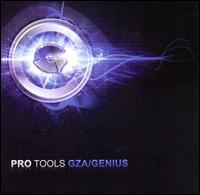
GZA
Pro Tools
(Babygrande; 2008)
By Chris Molnar | 8 September 2008
Pro Tools. What kind of a title is that? That’s the software that brought us Linkin Park; anybody can sound good now, we whined. But it’s pretty much de rigueur these days, and maybe appropriate for this decade. With the explosion of file sharing and copycat programs anybody really can sound good. It’s even sort of passé: auto-tweak extravaganzas like “Sensual Seduction,” “Lollipop” or, um, any T-Pain track are a pretty big percentage of what gets played on Hot 100 stations these days, and analog is always undergoing some kind of resurgence. But GZA is so old he probably doesn’t even know that. He was probably getting ready to tell everybody, “No, these stories are my pro tools. I’m a storyteller, motherfuckers. Fuck Nelly, I am real rap. ‘This is hip-hop.’ Remember?”
That’s probably a bit of an overstatement—in fact, one of the most memorable parts of the album is where he recounts the tale of a fan with a Wu-Tang facial tattoo, all in response to the very recent G-Unit beef. But one of the best things about GZA, or really any Wu-Tang Clan member, is how they seem a little bit outside of time. But by neither being a zeitgeist-grabbing Genius nor a throwback to his two-decade passed beginnings, he carves out a rare niche in hip-hop: a steady Artiste.
One way he does this is by using relatively unknown beatsmiths for the most part, eschewing RZA on all but a few tracks. A move used to great effect on the last commercially and critically significant Wu-Tang album, Ghostface’s Fishscale (2006), it keeps the beats hungry, raw, and for the most part interesting. As GZA moves to an indie label, so does his sound, and it serves his unassuming nature well. The new sound of Detroit (hailing place of producers Black Milk and Bronze Nazareth, among others) is ominous, Stax-Blockhead minimalist joints that GZA sounds terrific over, issuing his cryptic proclamations with real force, verve and charisma.
But the selling point here is always (natch) his Pro Tools themselves. On album highlight “Groundbreaking,” he takes us on a panoramic family journey over epic harpsichord, starting on the playground (“I’m in the schoolyard with my brother rhyming with my brother Jamel and Ra’ Allah / Vibe and took the beat and imagining how far the sound travel at the turn of the volume”) and climaxing with a goosebump-inducing guest spot from son Justice Kareem, during which the two finish each other’s sentences and give a viscerally audible sense of the type of familial bonds he’s talking about. His flow is, as always, commanding, effortless, and unrelenting, making it hard to grab individual lines when each is intricately related to the next. You know: “lyrics.” “All I need is a beat / With a continuous loop,” he rhymes on “Alphabet,” “and a live vibe, that’ll hypnotize like the flute.”
Lil’ Wayne this is not. Tha Carter III may also be one of the best albums of the year, but if GZA shows us anything it’s that the playing field of mainstream hip-hop is so wide that it’s a shame it all gets lumped together. Weezy is all about silly swagger, the zeitgeist, and Pro Tools in the technological sense. GZA exists almost completely apart. While fellow Wu-Tang members are undone by commercial catnip (witness Ghostface’s breakdown over Big Doe Rehab’s quality-consistent sales), ambition outstripping inspiration (as in RZA’s bizarre hatchet job on 8 Diagrams), or any number of other failings that tend to dog aging rappers, the Genius keeps his head down and runs, staying true to his strengths, taking his time, and letting pure lyrical inspiration—always his strength—lead him.





